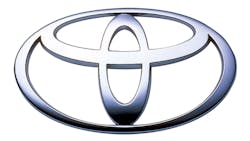TOKYO -- Toyota (IW 1000/8) on Wednesday said its full-year net profit more than tripled to $9.7 billion, with a weak yen and cost-cutting helping inflate the bottom line for the world's biggest automaker.
The Japanese giant also said it was on track for another soaring profit in the current fiscal year, underscoring the recovery among the nation's major automakers after the 2011 quake-tsunami disaster devastated sales and production, and highlighting strong demand in the key Asian and US markets.
Toyota's sales in the world's biggest vehicle market China -- which have been dented in the wake of a territorial dispute between Tokyo and Beijing -- were recovering, it added.
The yen, which has lost about one-fifth of its value on the dollar since November, has helped boost Japanese firms' competitiveness overseas and jacked up the value of their repatriated foreign income.
Toyota cited the currency among the factors for its profit jump, after domestic rival Honda said its net profit for the year to March soared 73.6% thanks to robust overseas sales, a weaker yen, and cost cutting.
Toyota on Wednesday said it booked a net profit of 962.1 billion yen (US$9.7 billion) in the fiscal year to March, up from 283.5 billion yen a year earlier, on sales of 22.0 trillion yen, an increase of 18.7% on-year.
The Camry and Corolla maker, which last year overtook General Motors (IW 500/5) to regain the title of world's biggest automaker, said it expected a net profit of 1.37 trillion yen for the fiscal year ending March 2014.
Toyota President Akio Toyoda on Wednesday said future growth would be "driven by the recovery of the U.S. market and the development of emerging markets."
Toyota's global vehicle sales hit 8.87 million units in the year to March, despite nearly flat results from recession-riddled Europe, with sales expected to rise to 9.1 million units this fiscal year, it said.
Japan's three biggest automakers -- Toyota, Nissan (IW 1000/26) and Honda (IW 1000/30) -- have seen results hurt by the fallout from the China-Japan diplomatic row over a group of islands in the East China Sea.
The long-standing dispute flared again in September when Tokyo nationalized some of the archipelago that is also claimed by Beijing, sparking huge demonstrations across China and a damaging boycott of Japanese brands.
Toyota Executive Vice President Nobuyori Kodaira said Wednesday that sales were recovering in China with April's results down about 7% from the same month last year before the diplomatic row exploded.
Volkswagen (IW 1000/10) and GM have tried to capitalize on their Japanese competitors' troubles in the country, and Kodaira acknowledged that "relations between Japan and China are likely to remain difficult."
Honda last month said its China sales have almost returned to normal levels while Nissan, which has the most exposure to China among Japan's top-three automakers, reports its results later this week.
Japan's automakers have also been hit by a string of damaging safety recalls that hurt their reputation for quality and safety.
But the nation's manufacturers are eyeing a pickup in domestic demand as Tokyo starts hiking sales taxes with a plan to double them to 10% over the next couple of years.
Japanese industry has also benefited from the big-spending and easy-money policies of Prime Minister Shinzo Abe, with huge monetary easing measures from the premier's hand-picked team at the Bank of Japan helping push down the yen.
-Kyoko Hasegawam, AFP
Copyright Agence France-Presse, 2013
About the Author
Agence France-Presse
Copyright Agence France-Presse, 2002-2025. AFP text, photos, graphics and logos shall not be reproduced, published, broadcast, rewritten for broadcast or publication or redistributed directly or indirectly in any medium. AFP shall not be held liable for any delays, inaccuracies, errors or omissions in any AFP content, or for any actions taken in consequence.
